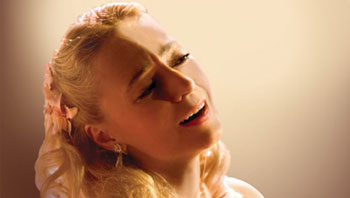Saturday night’s La Traviata opens on the beautiful salon of Violetta Valery (Maria Tonina) in the centre of Paris. As usual the costumiers and set designers of Ellen Kent Productions had excelled themselves, managing to convey with a few simple props and some stunning gowns all the luxury and splendour of the debutante’s home. Act 1 allows us to experience both the might of the chorus and the abilities of the individuals as the party unfolds. Tonina’s voice is superb and her grace on stage is unmistakeable, she blends well during the famous “Drinking Song (Libiamo Ne' Lieti Calici)" and still excels in her solo performances. Alfredo Germont is portrayed by Ruslan Zinevych, a tenor with a fabulously expressive voice. However, upon watching the interaction between Tonina and Zinevych during “The Day I Met You (Un di, falice, eterea)" Zinevych’s voice appears to be the only thing about him that is expressive. While Tonina moves around the stage with grace and accompanies phrases and melodies with hand gestures, always appearing to engage with the other characters, Zinevych appears to be singing to someone perpetually 6 feet in front of him.
This rather wooden façade makes Act 2 a little more believable as people often stiffen up when angry which Alfredo does after learning Violetta has accompanied the Baron to Flora’s party. Before this event, however, we meet the perpetrator of all the misery; Alfredo’s father, Giorgio Germont (Petru Racovita). Racovita comes off as magnificently as always, his stunningly powerful baritone is beautiful to listen to and awe-inspiring in its projection. His body language sets Germont aside as a fairly unsympathetic character during his discussions with Violetta and stands him in good stead for a turn around in Act 3.
Violetta’s reluctant abandonment of Alfredo in the arms of the Baron allows us to enter the second scene of Act 2 at Flora’s house. The party is in full swing and the chorus is once again allowed free reign during the entertainment. However, as is often the case with large operatic productions the orchestra seems to feel underdone and the brass and percussion once again seem to drown out the chorus. The rather unnecessary shower of gold confetti during the roudy “Twas Piquillo, so young and so daring (E Piquillo, un bel gagliardo)" combined with the rather weak chorus made Act 2, scene 2 rather disappointing. Oddly the one thing that redeems this rather poor Act is Zinevych, whose stiffness manages to come across as angry contempt in his final argument with a wilting Tonina.
The final scene opens with a transformed Tonina. All her grace has gone as she staggers convincingly round the stage, coughing with the last ravages of tuberculosis. Once more we witness the marvel of Racovita as his character finally accepts Violetta as a daughter and weeps as she declines. Tonina’s “So closes my sad story (Addio del Passato)" is portentous and makes the next songs seem superfluous. Violetta’s death is nevertheless a sudden affair and makes a dramatic end to what was overall a stunning performance of La Traviata.
- Jobs
- What's On
- Property
- For Sale
- Bikes
- Boats
- Books, CDs, Videos, DVDs
- Cars, Motorbikes & Caravans
- Children's Things
- Clothes & Accessories
- Computers
- Electric & Electronic
- Free Stuff!
- Furniture & Bedding
- Gardening
- Kitchen & Domestic Items
- Lifts, Journey Shares, Tickets
- Lost and Found
- Musicians, Instruments & Kit
- Other Sales
- Pets
- Phones
- Sports Equipment & Players
- Wanted
- Services
- Tuition
- Oxford Guide
- Food & Drink
- Reviews
- Blog
- About




